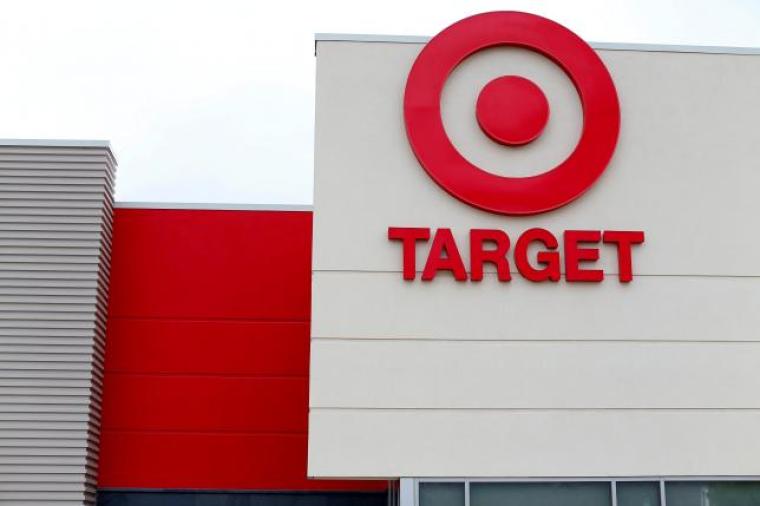Target stock price hits two-year low coinciding with boycott over bathroom policy

The stock value of Target Corporation has seen its biggest price drop in two years, coinciding with the conservative boycott over its controversial transgender bathroom policy.
On Tuesday, Target shares sank 12.1 percent to $58.79, and it projected first-quarter profit below Wall Street estimates, according to Reuters. While the company saw its online operations growing, it reported its third straight quarter of lower sales from existing stores. Brian Cornell, chairman and CEO of the discount retail giant, said that there has been an "unexpected softness" at its stores.
In April 2016, Target announced that it would allow its customers and employees to use restrooms that correspond to their gender identity. Following the announcement, conservative groups, such as 2nd Vote and the American Family Association (AFA), campaigned heavily to encourage families to shop elsewhere.
The groups argued that Target's bathroom policy would leave women and girls exposed to the dangers of sexual predators.
2ndVote Executive Director Lance Wray said that the company is "pushing a radical agenda over common-sense and safety." Target, however, maintained that its bathroom policy is aimed at helping people feel comfortable.
A report from Snopes has contended that the drop in Target's stock price was not caused by the boycott and that it was due to the 2017 guidance announced at an investor day event.
While Wall Street expected the company to project earnings of $5.30 per share, Target gave guidance of $3.80 to $4.20 per share, according to Edward Jones analyst Brian Yarbough. The guidance was "well below" expectations, resulting in the drop in share value.
In an email to Snopes, company spokeswoman Erika Winkels maintained that the bathroom policy had no effect on its business.
"We have made it clear over time that we've seen no material impact to the business based on the bathroom policy. We don't have anything new or different to share," Winkels wrote.
Shortly after the company announced the bathroom policy change, a report from USA Today, indicated that the percentage of people who would consider shopping at Target the next time they needed something dropped from 42 to 38 percent. YouGov CEO Ted Marzilli described the drop as a "significant" shift, but he insisted that the backlash against Target's position is not "catastrophic."
During a meeting with analysts and investors, Target vowed aggressive promotions and asserted that it will eventually win back market share by investing in technology and small stores.
 Christians don't have to affirm transgenderism, but they can’t express that view at work: tribunal
Christians don't have to affirm transgenderism, but they can’t express that view at work: tribunal Archaeology discovery: Medieval Christian prayer beads found on Holy Island
Archaeology discovery: Medieval Christian prayer beads found on Holy Island Presbyterian Church in America votes to leave National Association of Evangelicals
Presbyterian Church in America votes to leave National Association of Evangelicals Over 50 killed in 'vile and satanic' attack at Nigerian church on Pentecost Sunday
Over 50 killed in 'vile and satanic' attack at Nigerian church on Pentecost Sunday Ukrainian Orthodox Church severs ties with Moscow over Patriarch Kirill's support for Putin's war
Ukrainian Orthodox Church severs ties with Moscow over Patriarch Kirill's support for Putin's war Islamic State kills 20 Nigerian Christians as revenge for US airstrike
Islamic State kills 20 Nigerian Christians as revenge for US airstrike Man who served 33 years in prison for murder leads inmates to Christ
Man who served 33 years in prison for murder leads inmates to Christ


 Nigerian student beaten to death, body burned over ‘blasphemous’ WhatsApp message
Nigerian student beaten to death, body burned over ‘blasphemous’ WhatsApp message 'A new low': World reacts after Hong Kong arrests 90-year-old Cardinal Joseph Zen
'A new low': World reacts after Hong Kong arrests 90-year-old Cardinal Joseph Zen Iran sentences Christian man to 10 years in prison for hosting house church worship gathering
Iran sentences Christian man to 10 years in prison for hosting house church worship gathering French Guyana: Pastor shot dead, church set on fire after meeting delegation of Evangelicals
French Guyana: Pastor shot dead, church set on fire after meeting delegation of Evangelicals ‘Talking Jesus’ report finds only 6% of UK adults identify as practicing Christians
‘Talking Jesus’ report finds only 6% of UK adults identify as practicing Christians Mission Eurasia ministry center blown up in Ukraine, hundreds of Bibles destroyed: 'God will provide'
Mission Eurasia ministry center blown up in Ukraine, hundreds of Bibles destroyed: 'God will provide' Church holds service for first time after ISIS desecrated it 8 years ago
Church holds service for first time after ISIS desecrated it 8 years ago Burger King apologizes for 'offensive campaign' using Jesus' words at the Last Supper
Burger King apologizes for 'offensive campaign' using Jesus' words at the Last Supper Uganda: Muslims abduct teacher, burn him inside mosque for praying in Christ’s name
Uganda: Muslims abduct teacher, burn him inside mosque for praying in Christ’s name